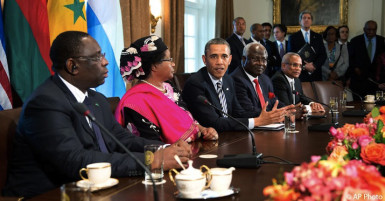During his trip to Africa last week, President Barack Obama gave a powerful speech asking the region’s long-entrenched leaders to end corruption, respect freedom of the press and stop changing the constitution to remain in power indefinitely. I wonder why he doesn’t make the same speech in Latin America.

“Corruption exists all over the world, including in the United States,” he added. “But here in Africa, corruption drains billions of dollars from economies that can’t afford to lose billions of dollars — that’s money that could be used to create jobs and build hospitals and schools.”
After his call on countries to take action against corruption, Obama spent much of his speech calling on governments to stop harassing independent media, and asking leaders not to stay in power indefinitely. Several of the African Union’s 54 member-countries have leaders who have been in power for a decade or longer.

“We all know what the ingredients of real democracy are: they include free and fair elections, but also freedom of speech and the press, freedom of assembly,” Obama said. “These rights are universal. They’re written into African constitutions.”
“Yet at this very moment, these same freedoms are denied to many Africans,” he went on. “When journalists are put behind bars for doing their jobs, or activists are threatened as governments crack down on civil society, then you may have democracy in name, but not in substance.”
In what was the most daring part of his speech, Obama said that “Africa’s democratic progress is also at risk when leaders refuse to step aside when their terms end.”
Mixing his stern message with humour, he reminded the audience that he is nearing the end of his second term, and that he loves his job, but that under the US Constitution he can’t run again.
“I actually think I’m a pretty good president. I think if I ran I could win,” he joked. “But I can’t … The law is the law … And no one person is above the law. Not even the president.”
He concluded, “When a leader tries to change the rules in the middle of the game just to stay in office, it risks instability and strife … And sometimes you’ll hear leaders say, well, I’m the only person who can hold this nation together. If that’s true, then that leader has failed to truly build their nation.”
My opinion: It was a phenomenal speech, which Obama should also make in Latin America. It would demand no extra work: He would just have to copy and paste it, and replace the word “Africa” for “Latin America.”
In Latin America, just like in Africa, corruption is rampant, freedom of the press is routinely repressed, and current or previous presidents of Venezuela, Bolivia, Ecuador, Nicaragua, Colombia and several other countries have in recent years changed their constitutions to remain in power — or allow their appointees to do it for them — indefinitely.
Cuba, with which Obama has just reestablished diplomatic relations and where Secretary of State John Kerry is scheduled to preside over the flag-raising ceremony at the US Embassy in Havana on August 14, is a hereditary military dictatorship run by a general. There has not been a free election or an independent TV station in Cuba in more than five decades.
Obama probably doesn’t dare make his African Union speech in Latin America because much more US trade and investments are at stake there. He did refer to these issues during the recent Summit of the Americas in Panama, but not nearly as bluntly as he did in Addis Ababa this week.
Granted, if he told these things to Latin American leaders, the region’s populist demagogues would immediately accuse him of meddling in their internal affairs in order to allegedly pursue sinister “imperialist” plans.
But after several years of corrupt leaders who hide behind nationalist demagoguery to justify their pursuit of absolute powers, many people in several Latin American autocracies want more rule of law, and more democracy.
To stress his point, Obama would just need to repeat what he said in Africa: that countries don’t need strong leaders, but strong institutions. And that if a leader claims to be the only one who can hold his nation together, the leader has failed to truly build that nation.
© The Miami Herald, 2015. Distributed by Tribune Media Services.





